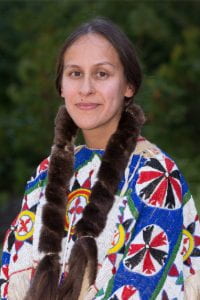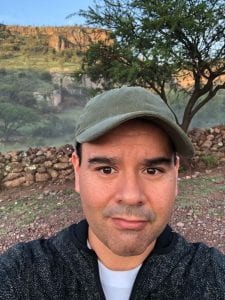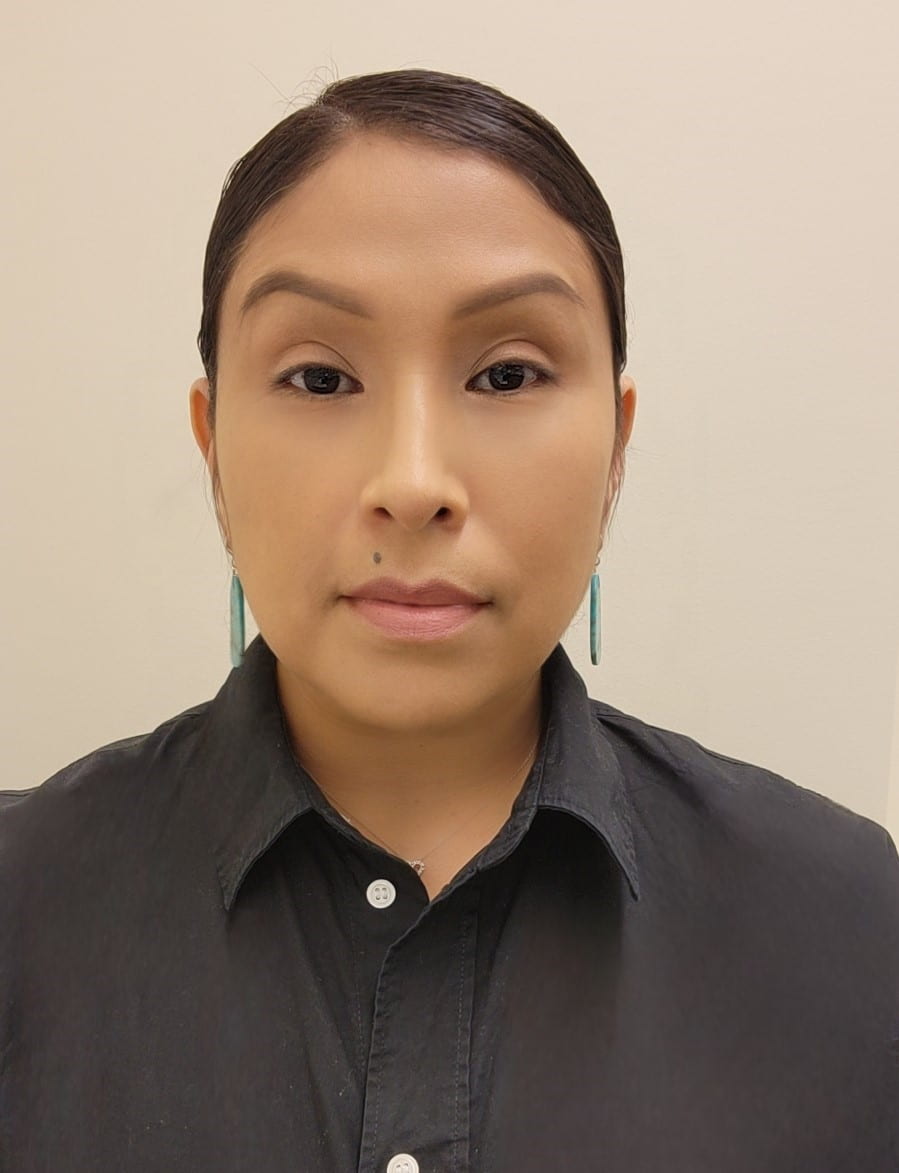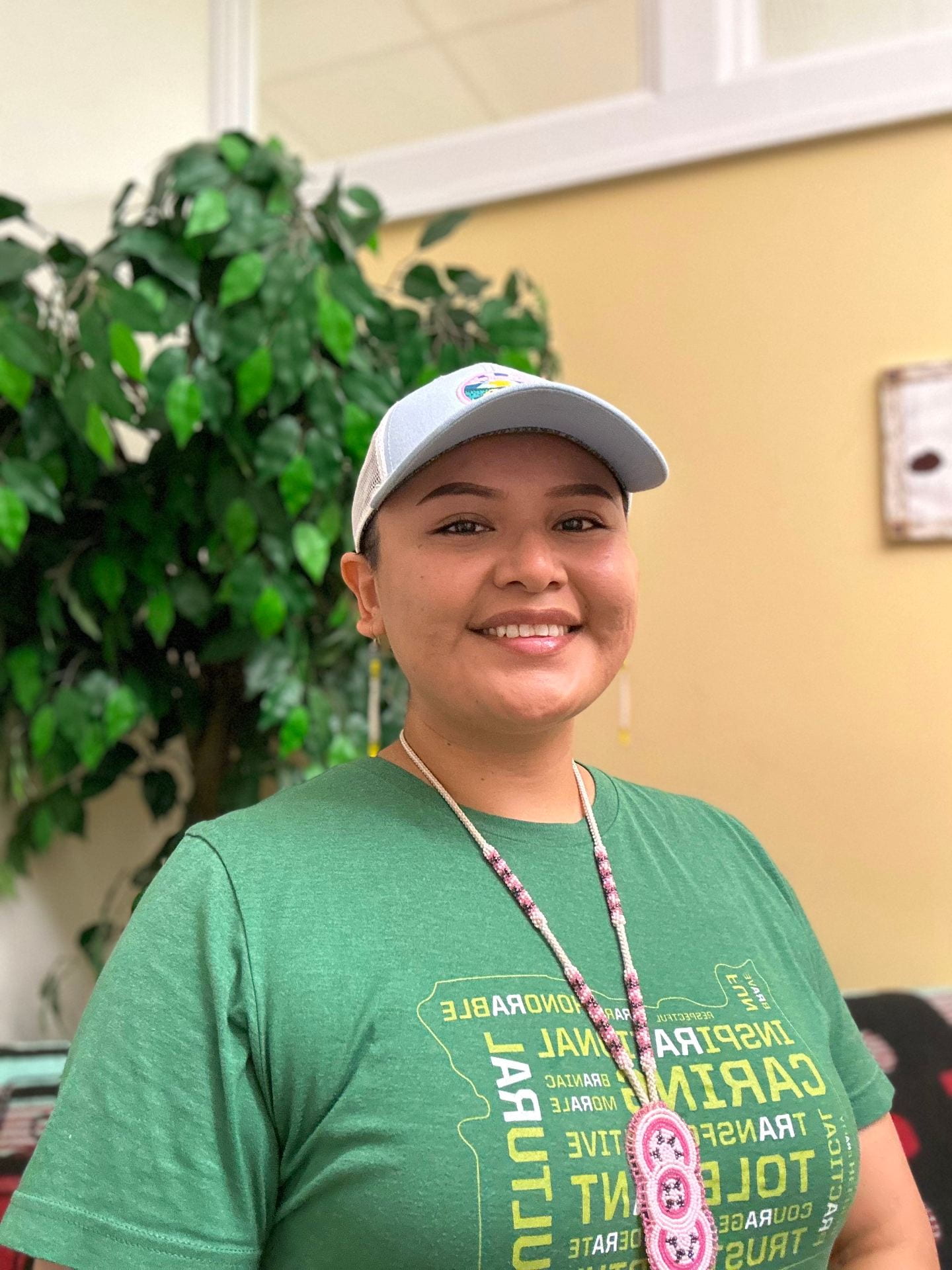Faculty and Staff
In loving memory átway Tuxámshish Dr. Virginia Beavert
We are honored to continue to uphold the teachings and lessons our beloved Elder shared with our program and students for many years.
 Tuxámshish Virginia R. Beavert (Yakama), Ph.D., is Distinguished Elder Educator in the Sapsik’ʷałá Program at the University of Oregon. She is also a long-time Advisor to the Northwest Indian Language Institute. Dr. Beavert established the Sahaptin/Ichishkíin language program at the University of Oregon and continues to advise and teach within classes on language and culture. She has served widely as a leader for her Tribal Nation and throughout Indian education, being the first woman elected as an officer of the Yakama Nation General Council Executive Board; she has published two dictionaries of Ichishkíin language. Her book, Wántwint Inmí Tiináwit: A Reflection of What I Have Learned, is published by the University of Washington Press. Her most recent book, Anakú Iwacha: Yakama Legends and Stories, Second Edition, is co-edited with Michelle M. Jacob and Joana W. Jansen.
Tuxámshish Virginia R. Beavert (Yakama), Ph.D., is Distinguished Elder Educator in the Sapsik’ʷałá Program at the University of Oregon. She is also a long-time Advisor to the Northwest Indian Language Institute. Dr. Beavert established the Sahaptin/Ichishkíin language program at the University of Oregon and continues to advise and teach within classes on language and culture. She has served widely as a leader for her Tribal Nation and throughout Indian education, being the first woman elected as an officer of the Yakama Nation General Council Executive Board; she has published two dictionaries of Ichishkíin language. Her book, Wántwint Inmí Tiináwit: A Reflection of What I Have Learned, is published by the University of Washington Press. Her most recent book, Anakú Iwacha: Yakama Legends and Stories, Second Edition, is co-edited with Michelle M. Jacob and Joana W. Jansen.
Select Interviews and Teachings:
- Virginia Beavert Keeps Legends and Language Alive
- Virginia Beavert: “They’re Practicing Their Indian Law.”
- Virgina Beavert: “So Why Not Speak Your Language”
Sapsik’ʷałá Program Co-Director, Principal Investigator and Faculty: Michelle Jacob, Ph.D. (Yakama Nation)
 Michelle M. Jacob is an enrolled member of the Yakama Nation and is Professor of Indigenous Studies and Co-Director of the Sapsik’ʷałá (Teacher) Education Program in the Department of Education Studies at the University of Oregon. Michelle also serves as Affiliated Faculty in the Department of Indigenous, Race, and Ethnic Studies, and Affiliated Faculty in the Environmental Studies Program. Michelle engages in scholarly and activist work that seeks to understand and work toward a holistic sense of health and well-being within Indigenous communities and among allies who wish to engage decolonization. Michelle’s personal website is: https://anahuymentoring.com/
Michelle M. Jacob is an enrolled member of the Yakama Nation and is Professor of Indigenous Studies and Co-Director of the Sapsik’ʷałá (Teacher) Education Program in the Department of Education Studies at the University of Oregon. Michelle also serves as Affiliated Faculty in the Department of Indigenous, Race, and Ethnic Studies, and Affiliated Faculty in the Environmental Studies Program. Michelle engages in scholarly and activist work that seeks to understand and work toward a holistic sense of health and well-being within Indigenous communities and among allies who wish to engage decolonization. Michelle’s personal website is: https://anahuymentoring.com/
Michelle’s books include: Yakama Rising: Indigenous Cultural Revitalization, Activism, and Healing, Indian Pilgrims: Indigenous Journeys of Activism and Healing with Saint Kateri Tekakwitha, On Indian Ground: A Return to Indigenous Knowledge-Generating Hope, Leadership and Sovereignty through Education in the Northwest (co-edited with Stephany RunningHawk Johnson), The Auntie Way: Stories Celebrating Kindness, Fierceness, and Creativity, Huckleberries and Coyotes: Lessons from Our More than Human Relations, Fox Doesn’t Wear a Watch: Lessons from Mother Nature’s Classroom, and Anakú Iwacha: Yakama Legends and Stories, Second Edition (co-edited with Virginia R. Beavert and Joana W. Jansen). Her most recent book is Birthday Gifts: Honoring People and Places We Love.
Michelle is a widely celebrated author and speaker engaging regional, national, and international audiences. She has numerous articles published in social science, education, and health science research journals, and has been awarded grant funding from the U.S. Department of Education, the National Endowment for the Humanities, the Spencer Foundation, the Robert Wood Johnson Foundation, and the National Science Foundation. Her research areas of interest include: Indigenous methodologies, spirituality, health, education, Indigenous feminisms, and decolonization. One of Michelle’s greatest joys is savoring the blessing of Nch’i-Wána (Columbia River) and her tributaries, including running and camping in beautiful places across the Columbia River basin.
Prior to joining the UO, Michelle served as Founding Director of the Center for Native Health & Culture at Heritage University on the Yakama Reservation, and as Professor of Ethnic Studies at the University of San Diego.
Email: mjacob@uoregon.edu
Sapsik’ʷałá Program Co-Director, Principal Investigator and Faculty: Leilani Sabzalian, Ph.D. (Alutiiq)
 Leilani Sabzalian (Alutiiq), Ph.D., is an Associate Professor of Indigenous Studies in Education and Co-Director of the Sapsik’ʷałá Program at the University of Oregon. Her research focuses on creating spaces to support Indigenous self-determination in public schools and challenge colonialism in education curriculum, policy, and practice. She is also dedicated to improving Indigenous education in the state of Oregon by serving on the American Indian/Alaska Native State Advisory Committee, and collaborating with the Office of Indian Education in Oregon to design and implement professional development on Tribal History/Shared History, a law that mandates tribal history and sovereignty curriculum in all K-12 public schools in the state.
Leilani Sabzalian (Alutiiq), Ph.D., is an Associate Professor of Indigenous Studies in Education and Co-Director of the Sapsik’ʷałá Program at the University of Oregon. Her research focuses on creating spaces to support Indigenous self-determination in public schools and challenge colonialism in education curriculum, policy, and practice. She is also dedicated to improving Indigenous education in the state of Oregon by serving on the American Indian/Alaska Native State Advisory Committee, and collaborating with the Office of Indian Education in Oregon to design and implement professional development on Tribal History/Shared History, a law that mandates tribal history and sovereignty curriculum in all K-12 public schools in the state.
Leilani’s first book, Indigenous Children’s Survivance in Public Schools, uses storytelling to document the ways colonialism continues to shape educational policy and practice, and foster educators’ anticolonial literacy and commitment to supporting Indigenous students in public schools. Her latest book, Teaching Critically About Lewis and Clark: Challenging Dominant Narratives in K-12 Curriculum, co-authored with Drs. Alison Schmitke and Jeff Edmundson, complicates the Corps of Discovery and promotes students’ active and critical engagement with history.
Email: leilanis@uoregon.edu
Business Manager: Teodoro Reyes-Ramirez
 Teodoro is the Business Manager for the Sapsik’ʷałá Program. Teodoro received his Bachelor’s of Science Degree in Accounting from the University of Oregon and has worked at the University of Oregon in the College of Education since 2006. He is currently the Business Manager of two grant management units in the College of Education, the Center for Equity Promotion (CEQP) and the Oregon Science Education Laboratory (OESL). Teodoro brings his expertise in coordinating externally funded projects, business operations, and project management and has extensive experience in training grants, such as Sapsik’ʷałá.
Teodoro is the Business Manager for the Sapsik’ʷałá Program. Teodoro received his Bachelor’s of Science Degree in Accounting from the University of Oregon and has worked at the University of Oregon in the College of Education since 2006. He is currently the Business Manager of two grant management units in the College of Education, the Center for Equity Promotion (CEQP) and the Oregon Science Education Laboratory (OESL). Teodoro brings his expertise in coordinating externally funded projects, business operations, and project management and has extensive experience in training grants, such as Sapsik’ʷałá.
Email: Treyesra@uoregon.edu
Graduate Employee: Kevin Simmons, M.Ed. (Confederated Tribes of Grand Ronde)
 Kevin in an enrolled member with the Confederated Tribes of Grand Ronde, a decedent of the Muckleshoot tribe of Washington. He currently works in child welfare and is an advocate for programs, services, and communities that strengthen tribal families through culturally based services and interventions. He is a fourth year PhD student at the University of Oregon with research interests in culturally based pedagogy, adaptations of evidence- based practices, and the utilization of culture and culturally responsive practices to impact western based outcomes for American Indian/Alaskan Native people, families, and communities. As a father of 5 children, Kevin believes his greatest achievements are centered on family (tilixam) life.
Kevin in an enrolled member with the Confederated Tribes of Grand Ronde, a decedent of the Muckleshoot tribe of Washington. He currently works in child welfare and is an advocate for programs, services, and communities that strengthen tribal families through culturally based services and interventions. He is a fourth year PhD student at the University of Oregon with research interests in culturally based pedagogy, adaptations of evidence- based practices, and the utilization of culture and culturally responsive practices to impact western based outcomes for American Indian/Alaskan Native people, families, and communities. As a father of 5 children, Kevin believes his greatest achievements are centered on family (tilixam) life.
Kevin’s current work includes co-leading the implementation of the culturally informed practice of Motivational Interviewing (MI) within the social services units of the nine federally recognized tribes of Oregon. In this work, Kevin has collaborated with the Oregon Department of Human Services (ODHS), University of Iowa’s Native Center for Behavioral Health, and the nine tribes of Oregon. He has also served on research teams with the American Indian Higher Education Consortium (AIHEC) developing a Student Success framework to be implemented at tribal colleges and universities.
Graduate Employee: Haeyalyn Muniz, Ed.D. (Jicarilla Apache)
 Haeyalyn is a third year Ph.D. student in the Critical and Sociocultural Studies in Education Program at the University of Oregon.She previously served as the Chair for the Board of Regents, Southwestern Indian Polytechnic Institute, and served her tribal community as an Education Specialist before moving to Oregon.
Haeyalyn is a third year Ph.D. student in the Critical and Sociocultural Studies in Education Program at the University of Oregon.She previously served as the Chair for the Board of Regents, Southwestern Indian Polytechnic Institute, and served her tribal community as an Education Specialist before moving to Oregon.

Rena grew up Black/bi-racial on the traditional homelands of the Miami Nation in Fort Wayne, Indiana. She completed her D.Ed in Educational Leadership from UO in 2020. A longtime Ethnic Studies teacher dedicated to challenging the marginalization of young people, Rena is most proud of working with youth in “school adjacent” settings such as organizing a Youth Open Mic for Eugene area youth for ten years; serving as a facilitator of the Youth Action Project at the White Privilege Conference (WPC) in 2014 and 2015; working with local Black and Brown secondary-aged students to address institutional racism through a series of symposiums since 2016; and most recently, working with incarcerated youth to develop culturally responsive work skills curricula. Currently, she co-facilitates a Community of Practice for educators teaching SB13 Tribal History/Shared History curricula in Lane County with Leilani Sabzalian, Roshelle Wieser-Nieto, and Leah Dunbar (lifetime teaching partner and identical twin sister). Rena’s intention is that her time with Sapsik’ʷałá will deepen her ability to serve young people in ways that honor the connections between culturally accurate and aligned curricula, Black Liberation, Indigenous Sovereignty, healthy communities, and justice. She is honored to return to the Sapsik’ʷałá Teacher Education program to serve as coordinator for the Sapsik’ʷałá Grow Your Own(GYO) Future Teachers Program.
Email: gyo@uoregon.edu Phone: 541-346-0733
Sapsik’ʷałá Indigenous Education Assistant: Angela Noah (White Mountain Apache)
 Angela Noah (she/they) is Choctaw and an enrolled citizen of the White Mountain Apache Tribe raised on the Fort Apache Indian Reservation in eastern Arizona. She serves as the Indigenous Education Assistant for program staff and students. Angela connected with Sapsik’ʷałá by participating in the 2023 Grow Your Own (GYO) Future Teachers Project. She is a UO Senior majoring in Planning, Public Policy and Management with a Native and Indigenous Studies minor. Angela’s academic leadership involvement prior to the Sapsik’ʷałá program includes serving as the Native American Student Union (NASU) Co-Director, 2020-2023 Miss Indigenous University of Oregon, and a Community Assistant for the university’s Students & Family Housing community. Prior to the UO, Angela served as a tribal liaison for a local non-profit and is an alumnus of Chemawa Indian School in Salem, Oregon. Angela’s work for Alaska Native and Indigenous-identifying youth also includes serving as a former Earth Ambassador, 25 Under 25 awardee, and the Northwest Peer Guide youth facilitator under the United National Indian Tribal Youth (UNITY) Inc, a national non-profit serving Native American youth in the country.
Angela Noah (she/they) is Choctaw and an enrolled citizen of the White Mountain Apache Tribe raised on the Fort Apache Indian Reservation in eastern Arizona. She serves as the Indigenous Education Assistant for program staff and students. Angela connected with Sapsik’ʷałá by participating in the 2023 Grow Your Own (GYO) Future Teachers Project. She is a UO Senior majoring in Planning, Public Policy and Management with a Native and Indigenous Studies minor. Angela’s academic leadership involvement prior to the Sapsik’ʷałá program includes serving as the Native American Student Union (NASU) Co-Director, 2020-2023 Miss Indigenous University of Oregon, and a Community Assistant for the university’s Students & Family Housing community. Prior to the UO, Angela served as a tribal liaison for a local non-profit and is an alumnus of Chemawa Indian School in Salem, Oregon. Angela’s work for Alaska Native and Indigenous-identifying youth also includes serving as a former Earth Ambassador, 25 Under 25 awardee, and the Northwest Peer Guide youth facilitator under the United National Indian Tribal Youth (UNITY) Inc, a national non-profit serving Native American youth in the country.